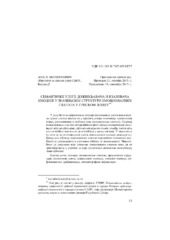Приказ основних података о документу
Семантичке улоге доживљавача и изазивача емоције у значењској структури емоционалних глагола у српском језику
The experiencer and stimulus semantic roles in the argument structure of emotional verbs in the Serbian language
| dc.creator | Миленковић, Ана | |
| dc.date.accessioned | 2017-10-19T10:53:23Z | |
| dc.date.available | 2017-10-19T10:53:23Z | |
| dc.date.issued | 2015 | |
| dc.identifier.issn | 0027-8084 | |
| dc.identifier.uri | https://dais.sanu.ac.rs/123456789/1186 | |
| dc.description.abstract | У раду се из перспективе теорије семантичких улога анализира група глагола којима се у српском језику означавају психолошка стања, расположења и осећања (тзв. емоционални глаголи). Садржај емоционалних глагола посматран је кроз призму емоционалне ситуације која подразумева узрочно-последичан однос између онога који нешто осећа и онога што дато осећање у њему изазива. У зависности од тога да ли се семантичка улога доживљавача емоције додељује субјекту или објекту, емоционалне глаголе сматраћемо статичним (субјекат је доживљавач) и узрочним (објекат је доживљавач). Питамо се који се статични емоционални глаголи могу трансформисати у узрочне, и који граматички механизми омогућавају такве промене. | sr |
| dc.description.abstract | The aim of this study is to analyze the meaning of a group of verbs denoting psychological states, moods and feelings (i.e. emotional verbs) in the Serbian language. We will consider the meanings of emotional verbs to be part of a wider emotional situation in which the relationship between the subject and object is causally-consequential. Depending on whether the semantic role of the experiencer is attributed to the subject or the object of the emotional verb, we will divide verbs into two classes: stative (subject-experiencer) and causative (object-experiencer) verbs. We will then try to determine which stative emotional verbs are able to transform into causative emotional verbs, and which grammatical mechanisms allow these changes. | en |
| dc.language.iso | sr | sr |
| dc.publisher | Београд : Институт за српски језик САНУ | sr |
| dc.relation | info:eu-repo/grantAgreement/MESTD/Basic Research (BR or ON)/178009/RS// | sr |
| dc.rights | openAccess | sr |
| dc.rights.uri | https://creativecommons.org/licenses/by-nc-nd/4.0/ | |
| dc.source | Наш језик | sr |
| dc.subject | емоције | sr |
| dc.subject | емоционални глаголи | sr |
| dc.subject | аргументска структура | sr |
| dc.subject | семантичке улоге | sr |
| dc.subject | доживљавач емоције | sr |
| dc.subject | изазивач емоције | sr |
| dc.subject | рефлексивност | sr |
| dc.subject | префиксација | sr |
| dc.subject | лексикографска дефиниција | sr |
| dc.subject | emotions | sr |
| dc.subject | verbs of emotion | sr |
| dc.subject | argument structure | sr |
| dc.subject | semantic roles | sr |
| dc.subject | experiencer | sr |
| dc.subject | stimulus | sr |
| dc.subject | prefixation | sr |
| dc.subject | lexicographic definition | sr |
| dc.title | Семантичке улоге доживљавача и изазивача емоције у значењској структури емоционалних глагола у српском језику | sr |
| dc.title | The experiencer and stimulus semantic roles in the argument structure of emotional verbs in the Serbian language | en |
| dc.type | article | sr |
| dc.rights.license | BY-NC-ND | sr |
| dcterms.abstract | Milenković, Ana; Semantičke uloge doživljavača i izazivača emocije u značenjskoj strukturi emocionalnih glagola u srpskom jeziku; | |
| dc.rights.holder | Институт за српски језик САНУ | sr |
| dc.citation.spage | 23 | |
| dc.citation.epage | 38 | |
| dc.citation.volume | 46 | |
| dc.citation.issue | 3-4 | |
| dc.identifier.cobiss | 615951 | |
| dc.type.version | publishedVersion | sr |
| dc.identifier.fulltext | https://dais.sanu.ac.rs/bitstream/id/3662/bitstream_3662.pdf | |
| dc.identifier.rcub | https://hdl.handle.net/21.15107/rcub_dais_1186 |

